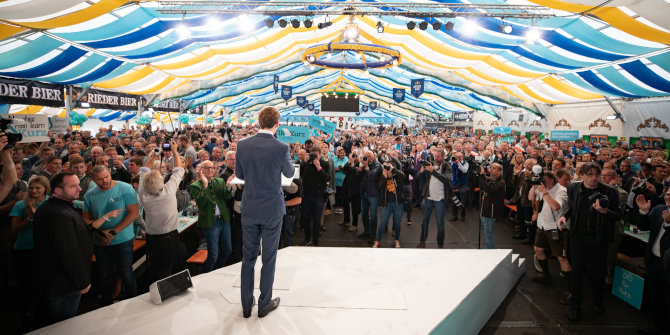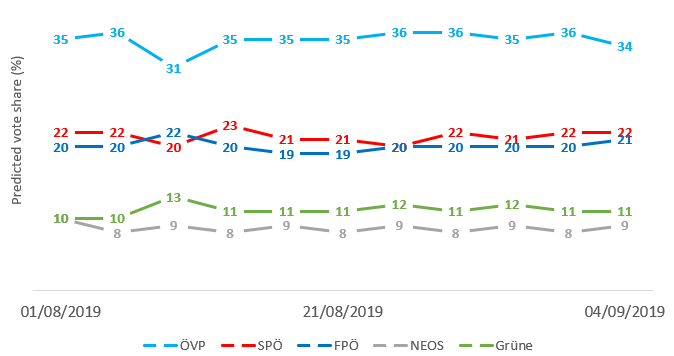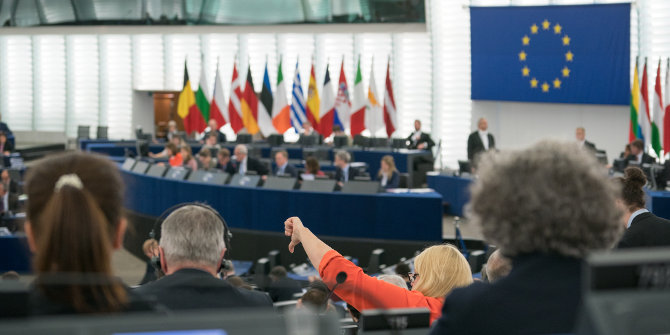 Austria will hold a parliamentary election on 29 September. The election was called following the collapse of the governing coalition between the Austrian People’s Party (ÖVP) and the Freedom Party of Austria (FPÖ). Paul Schmidt previews the vote, explaining that awareness of the interlinkages between domestic and European politics and a relative rise in political interest will be two important factors in the campaign.
Austria will hold a parliamentary election on 29 September. The election was called following the collapse of the governing coalition between the Austrian People’s Party (ÖVP) and the Freedom Party of Austria (FPÖ). Paul Schmidt previews the vote, explaining that awareness of the interlinkages between domestic and European politics and a relative rise in political interest will be two important factors in the campaign.
Political systems need to adapt to changing times. Traditional party voter relationships are diminishing, preferences are becoming more dynamic and societies are increasingly polarised. Political parties are being challenged by political start-up movements resembling public relations agencies rather than likeminded groups of people with the same ideologies and interests. Political colours and opinions are adjusting to a shifting media landscape with the aim of raising attention and winning elections. Austria is no exception to these trends.
When Sebastian Kurz took over as leader of the Austrian People’s Party (ÖVP) in May 2017, he rapidly rebranded his old party, which had been in government for more than thirty years, and five months later succeeded in winning the parliamentary elections he had called for. The Social Democrats (SPÖ) were caught on the wrong foot and driven into opposition. Anti-migration sentiments and the rise of a brand of “Austria first” rhetoric coalesced with vested partisan and individual business interests, leading to a coalition government with the nationalist Freedom Party (FPÖ) and ending another decade of grand coalition with the Social Democrats. A grand coalition which was ultimately blamed for all perceived evil, in particular for blocking progress and consensus driven politics.

Sebastian Kurz speaking at a campaign event ahead of the 2019 election, Credit: ooevp-at (CC BY-ND 2.0)
It was replaced by strong leadership with no strong sense for compromise. Drawing on lessons from the past, the ÖVP circumvented interference by the FPÖ in European affairs by drafting a coalition agreement with pro-European policy stances and delegating most of the competences to Chancellor Kurz and his cabinet members, securing a smooth but rather unnoticed Austrian EU Council presidency. Nevertheless, the ÖVP did not shy away from treading the line between their often cited pro-European mindset and shallow criticism of European integration. The government refrained from proposing concrete solutions and following up on them, preferring to play to their home audience which has a rather critical opinion regarding the functioning of the European Union.
While the FPÖ was consciously left aside on European issues, the party’s leaders still managed to make their voices heard, for instance by questioning the legal basis for the infringement procedures against Hungary and by pushing the government to abstain from supporting the UN global migration pact. After 18 polarised months, many xenophobic hick ups by FPÖ members and a rather bizarre secretly taped video-clip, the government fell.
The seven-minute clip, filmed in Ibiza in 2017, was taken from many hours of conversations. It showed two of the FPÖ’s top political leaders, including the party’s Chairman, Heinz-Christian Strache, allegedly offering to sell out Austrian public goods to a fake Russian oligarch with the aim of grabbing control of the biggest national newspaper and boosting the party’s finances. It was the tipping point for the coalition. Strache had to step down as FPÖ Chairman and Vice Chancellor of Austria, while the Austrian Chancellor sacked their Minister of the Interior, calling for new parliamentary elections.
As a consequence, the FPÖ immediately left the coalition and the Austrian parliament passed a no confidence vote against an interim government led by Kurz – an event unprecedented in modern Austrian politics. A government of experts was put in place by the Austrian President to administrate governmental affairs until the parliamentary election on 29 September.
What to expect from the 2019 election?
Polls currently show a comfortable lead for the ÖVP, with the SPÖ and their still rather new leader Pamela Rendi-Wagner modestly gaining ground. Surprisingly, or not, the FPÖ does not seem to have lost many of its followers over the latest scandal – they have claimed their leaders were set up by their political opponents and have not done anything wrong. The polling data is supported by the fact that the FPÖ scored relatively highly in the European elections in May. Indeed, despite the scandal and being placed in a low position on the FPÖ’s party list, Strache won such a large number of preferential votes that he would have been elected as an MEP had he not decided to turn the opportunity down.
Victimisation and playing the blame game works well for the FPÖ as a strategy to reach their core audience. They are currently neck and neck with the SPÖ, which is focusing on social affairs and climate change, while the FPÖ promotes their concept of “Austria first” and aims to continue with the failed government coalition. The Greens are likely to return to the Austrian parliament and better the support of the liberal NEOS, while the Liste Pilz, formed in 2017 mainly out of renegades from the Greens, will struggle to successfully pass the 4 percent threshold required to enter parliament.
Figure: Polling for the 2019 Austrian parliamentary election
Note: Figures from 11 major polls conducted between the beginning of August and 4 September 2019.
In terms of future coalition options, the ÖVP could have all the cards in its hands to pick and choose between new and old tentative partners. The likely preferences seem to be either to enter government with a renewed FPÖ or try an alternative path with the Liberals and/or the Greens.
However, a third of the electorate is still undecided. While migration related issues – which were dominant in the 2017 elections – are barely mentioned today, topics such as political transparency, party financing rules and social fairness, but in particular climate change, have moved to the top of public discussions. Even though EU issues are dealt with relatively randomly in the respective national election campaigns, the European dimension of the topics mentioned above is obvious.
Many of the issues we are facing – be it climate protection, trade agreements, migration or economic growth and employment – in the end can only be tackled jointly across borders. Moreover, the next European legislative cycle, which is about to start, desperately needs new ideas for improving the functioning of European integration. There is a clear need to strategically boost Austria’s position within the EU, which an interim government is not mandated to do. The turnout in the last EU elections rose 14 percentage points in Austria. This is not without reason. Awareness of the interlinkages between domestic and European politics and interest in politics on the whole is growing. Thus, expect Austrians to seize this new electoral opportunity and go to the polls.
Please read our comments policy before commenting.
Note: This article gives the views of the author, not the position of EUROPP – European Politics and Policy or the London School of Economics.
_________________________________
 Paul Schmidt
Paul Schmidt
Paul Schmidt is Secretary General of the Austrian Society for European Politics.





“with the SPÖ and their still rather new leader Pamela Rendi-Wagner modestly gaining ground.”
Nope, they are polling at 20-23 percent, which would be their worst result in the party history.